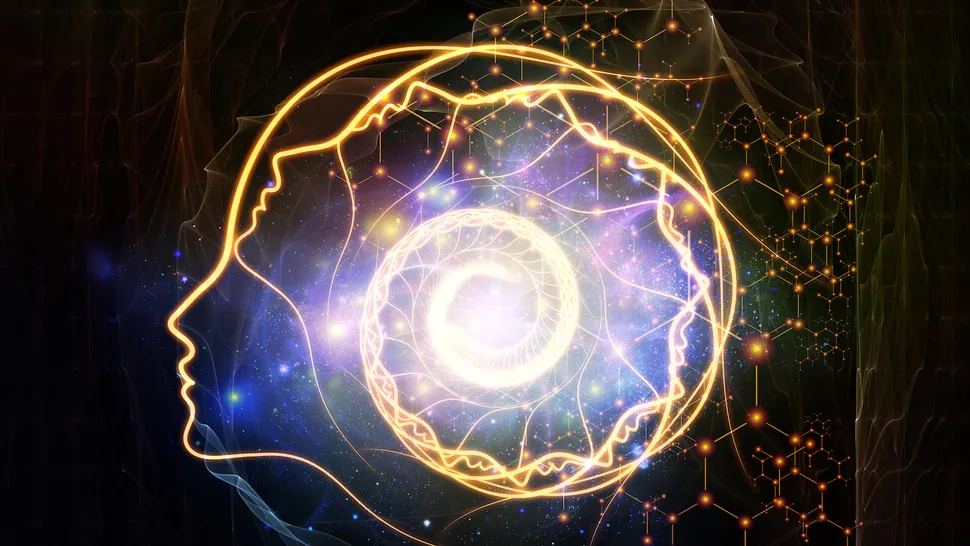The Conscious UniverseThe radical idea that everything has elements of consciousness is reemerging and breathing new life into a cold and mechanical cosmos.
London was a crowded city in 1666. The streets were narrow, the air was polluted, and inhabitants lived on top of each other in small wooden houses. That’s why the plague spread so easily, as well as the Great Fire. So did gossip, and the talk of the town was Margaret Cavendish, the Duchess of Newcastle.
Cavendish was a fiery novelist, playwright, philosopher and public figure known for her dramatic manner and controversial beliefs. She made her own dresses and decorated them in ribbons and baubles, and once attended the theater in a **** gown with red paint on her nipples. In his diaries, Samuel Pepys described her as a “mad, conceited, ridiculous woman,” albeit one he was obsessed with: He diarized about her six times in one three-month spell.
If the dominant worldview of Christianity and the rising worldview of science could agree on anything, it was that matter was dead: Man was superior to nature. But Cavendish, Spinoza, Bruno and others had latched onto the coattails of an ancient yet radical idea, one that had been circulating philosophy in the East and West since theories of mind first began. Traces of it can be found in Hinduism, Buddhism, Taoism, Christian mysticism and the philosophy of ancient Greece, as well as many indigenous belief systems around the world. The idea has many forms and versions, but modern studies of it house them all inside one grand general theory: panpsychism.
“If the panpsychists are right, it could cast doubt on the foundations of a worldview that has been deeply embedded in our psyche for hundreds of years: that humans are superior to everything around them.”
Derived from the Greek words pan (“all”) and psyche (“soul” or “mind”), panpsychism is the idea that consciousness — perhaps the most mysterious phenomenon we have yet come across — is not unique to the most complex organisms; it pervades the entire universe and is a fundamental feature of reality. “At a very basic level,” wrote the Canadian philosopher William Seager, “the world is awake.”
At the turn of the 12th century, the Christian mystic Saint Francis of Assisi was so convinced that everything was conscious that he tried speaking to flowers and preaching to birds. In fact, the history of thought is dotted with very clever people coming to this seemingly irrational conclusion. William James, the father of American psychology, was a panpsychist, as was the celebrated British mathematician Alfred North Whitehead; the Nobel Prize-winning physicist Max Planck once remarked in an interview, “I regard consciousness as fundamental.” Even the great inventor Thomas Edison had some panpsychist views, telling the poet George Parsons Lathrop: “It seems that every atom is possessed by a certain amount of primitive intelligence.”
But over the course of the 20th century, panpsychism came to be seen as absurd and incompatible in mainstream Western science and philosophy, just a reassuring delusion for New Age daydreamers. Karl Popper, one of the most influential philosophers of recent times, described it as “trivial” and “grossly misleading.” Another heavyweight, Ludwig Wittgenstein, waved away the theory: “Such image-mongery is of no interest to us.” As the American philosopher John Searle put it: “Consciousness cannot be spread across the universe like a thin veneer of jam.”
If the panpsychists are right, it could cast doubt on the foundations of a worldview that has been deeply embedded in our psyche for hundreds of years: that humans are superior to everything around them, disconnected from the insensate matter of nature, marooned on a crumbling planet in a cold and mechanical universe. Panpsychism re-enchants the world, embeds us profoundly within the climate crisis and places us on a continuum of consciousness with all that we see around us.
See also:
https://trueleft.createaforum.com/ancient-world/antropocentricism-the-most-dangerous-ideology-in-the-world/The notion of a world awake might seem unintuitive to most of us, but it is something we adopt naturally in childhood. In 1929, the Swiss psychologist Jean Piaget found that children between two and four years old are inclined to attribute consciousness to everything around them. A child can happily talk to a grasshopper and blame the pavement if they trip up, and it isn’t such an alien thought, at that age, to think a flower might feel the sunlight and perhaps even enjoy it. Fairy tales and children’s media are infused with animate worlds in which trees, animals and objects come to the aid or annoyance of a protagonist.
Most of us dismiss these notions as we mature. Gradually, we rein the concept of consciousness closer and closer in, until, at least in the West, we usually settle on the traditional view that consciousness is present only in the brains of humans and higher animals.
But in the last 10 years or so, this understanding has been repeatedly disrupted by new scientific breakthroughs. We are now well versed in the playfulness and creativity of cephalopods, the intelligent communication between fungi and the interspecies sharing economy in forests. Honeybees recognize faces, use tools, make collective decisions, dance to communicate and appear to understand higher-order concepts like zero. Plants can feel you touching them. In fact, the evolutionary ecologist Monica Gagliano has suggested that pea plants can learn behavior, identify the sound of running water and grow towards it and communicate via clicking sounds. When you consider that plants account for around 80% of the total biomass on Earth (the biomass of humans is roughly equivalent to that of Antarctic krill), then extending consciousness to them would mean we are living on a vastly conscious planet.
Eddington, like Russell before him, felt that the intrinsic nature of matter, the thing that has mathematical structure, could be integral to explaining consciousness. He wrote that there is one clump of matter that we know and experience directly, not through perceptions, equations or measuring devices: the matter that constitutes our brains. We know that the intrinsic matter that constitutes our brains must involve consciousness because that is our rich and subjective moment-to-moment experience of reality.
Since the 1930s, our scientific understanding of the fundamental building blocks of reality has become even weirder. Particles have been shown to behave like waves and waves like particles, depending on the experimental conditions. Particles no longer seem to be the fixed and knowable objects they once were, and different particle physicists will give you different answers to the question, “What is a particle?” Perhaps it is a quantum excitation of a field, vibrating strings or simply what we measure in detectors. “We say they are ‘fundamental,’” Xiao-Gang Wen, a theoretical physicist at the Massachusetts Institute of Technology, told Quanta Magazine. “But that’s just a [way to say] to students, ‘Don’t ask! I don’t know the answer. It’s fundamental; don’t ask anymore.’”
“Physical science only tells us what stuff does, not what stuff is. It’s not telling us the underlying nature of the stuff that is behaving in this way.”
— Philip Goff
Christianity didn’t create the ecological crisis, White asserted, but it laid the foundations for an abusive relationship between man and nature. (What White meant to say was JUDEO-CHRISTIANITY'S ANTROPOCENTRIC WORLD-VIEW IS LAREGELY RESPONSIBLE FOR THE ECOLOGICAL CRISIS BECAUSE JUDEO-CHRISTIANITY IS THE CORNERSTONE OF WESTERN CIVILIZATION FFS!!!) This religious ideology was infused with the Scientific Revolution (of which the key drivers were deeply religious Christians like Galileo, Descartes, Newton and Bacon) and ushered in an age of technology, capitalism and colonialism that thrived on exploiting the Earth. The universe came to be viewed not as organic and animate, but as a mindless machine, like a clock, the gears of which are governed by scientific laws. The wonder and unpredictability of nature was transformed into something stable, predictable, knowable and therefore controllable. Forests were there to be cleared, hills were there to be mined and animals were there to be slaughtered. This became known as the “mechanistic worldview.” As the science historian Carolyn Merchant wrote in a 1980 book: “Because it viewed nature as dead and matter as passive, mechanism could function as a subtle sanction for the exploitation and manipulation of nature and its resources.”
While we might think we are now living in a “post-Christian age,” this deeply entrenched mindset still haunts us. This “relation to nature,” White wrote, is “almost universally held not only by Christians and Neo-Christians but also by those who fondly regard themselves as post-Christians. (JUDEO-CHRISTIANS AND JEWS FFS!!!) Despite Copernicus, all the cosmos rotates around our little globe. Despite Darwin, we are not, in our hearts, part of the natural process.” Echoes of this story, Naomi Klein wrote in her 2014 book “This Changes Everything,” reverberate through a “cultural narrative that tells us that humans are ultimately in control of the Earth, and not the other way around. This is the same narrative that assures us that, however bad things get, we are going to be saved at the last minute — whether by the market, by philanthropic billionaires or by technological wizards.”
Mathews thinks we are now on the verge of another paradigm shift, whether that is to panpsychism or some other worldview that sees nature as more than unfeeling matter. “Our current worldview is leading to the ecological collapse of the planet,” she said. “And it is completely pragmatically self-defeating to continue with it.”
If nature\Yahweh cared about the living and their suffering would nature do stuff like this:

One of the biggest mistakes many human-beings make is believing that nature and the living are one in the same. When in actuality nature\Yahweh are nothing more than prison wardens!!! Life would be so much better off without natural selection corrupting it at every turn!!!
Continuing:
Margaret Cavendish had a fairly robust set of environmental ethics that was rare in 1600s Europe. At a time when Descartes — who gave his dog the very human name Monsieur Grat (“Mr. Scratch”) — was arguing that animals were machine-like senseless automata that felt neither pain nor pleasure, Cavendish was trying to create a dialogue between man and nature.
In her poems “The Hunting of the Hare” and “The Hunting of the Stag,” she abandoned the human perspective to adopt that of the animal being killed. In another, she imagined a conversation between a man and the tree he is about to cut down. These views and others ostracized her from the 17th-century scientific community, and much of her work was either ignored or dismissed. When she became the first woman to visit the all-male scientific institution of the Royal Society in May 1667, Pepys’ account of her visit focused mostly on the offensiveness of her dress. She was viewed by many as insane and irrational; they labeled her “Mad Madge.”
Westerners! Indeed, it's difficult to justify the industrial revolution, colonialism, and capitalism, if you care what non-humans think and feel, right!? I mean, if you start walking down that path what's next, caring how "blacks" and "women" feel about their exploitation? Or even worse, caring how children feel? Heaven forbid!!!
Continuing with the article:
But none of this dissuaded Cavendish, who, in her lifetime, published numerous books of philosophy, fiction, plays and poetry. “I had rather appear worse in singularity,” she said, “than better in the mode.” And if anyone was being irrational, thought Cavendish, it certainly wasn’t her. “Man is more irrational,” she wrote in 1664, “when he believes that all knowledge is not only confined to one sort of Creatures, but to one part of one particular Creature, as the head, or brain of man.”
Entire article:
https://www.noemamag.com/the-conscious-universe/










